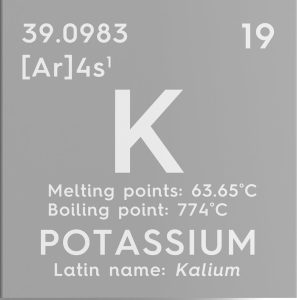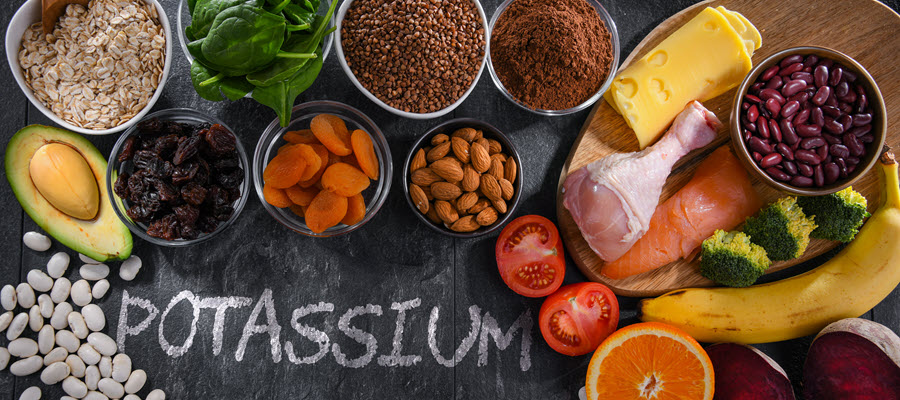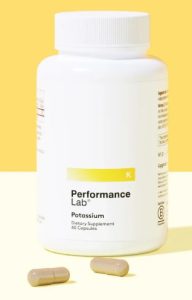Table of Contents
Key Takeaways
- Potassium is an essential mineral that supports brain health and cognitive function.
- Potassium nootropic benefits include helping regulate fluid balance, nerve signals, and muscle contractions in the body.
- Potassium for brain health means optimal potassium levels are crucial for optimal brain communication, neurotransmitter release, and cognitive processes.
- A potassium-rich diet may reduce the risk of stroke, heart disease, and kidney stones.
- The recommended daily intake of potassium supplements for memory and focus is 3,500-4,700 mg, which can be obtained through a diet rich in fruits and vegetables. Or a Potassium nootropic supplement.
Potassium is the 3rd most abundant mineral in your brain and body. And is key in maintaining normal cellular function.
Nearly every cell in your body has a Na+-K+-ATPase (sodium-potassium pump). It pumps Na+ (sodium) out of the cell and K+ (potassium) into the cell.
Potassium improves cognitive function by maintaining the electrical activity between neurons. Which affects the action of neurotransmitters used for learning and memory.
And potassium helps regulate brain blood flow needed for the delivery and flow of oxygen and nutrients into your brain for optimal cognitive performance.
In this review, I’ll show how adding potassium to your nootropic stack may help boost memory and decrease anxiety and depression.
Potassium helps:
- Brain cell signaling – The Na+-K+-ATPase (sodium-potassium pump) maintains optimal levels of potassium in cells needed for the action potential needed for brain cell communication.
- Brain blood flow – Potassium helps regulate brain blood flow needed to delivery of oxygen and nutrients required for optimal cognitive performance.
- Anxiety & depression – Adequate potassium supports brain function and neurotransmitter function required for mood and less anxiety.
What is Potassium?
Potassium is a key mineral and electrolyte. It helps keep the fluids in your body stay in balance, controls muscle movement, and is involved in brain cell signaling.[i]
 98% of the potassium in your body is found in muscle tissue and bone cells.[ii]
98% of the potassium in your body is found in muscle tissue and bone cells.[ii]
Potassium (K+) is the primary positively charged ion inside of cells. And sodium (Na+) is the primary ion in the extracellular fluid (outside the cell).
The Na+/K+-ATPase enzyme maintains this voltage difference by pumping potassium into a cell while pumping sodium out of the cell.
The “ATP” part of the equation means the enzyme uses energy from ATP to pump sodium out of the cell in exchange for potassium.
This exchange of sodium and potassium is known as the sodium-potassium pump. And is necessary for nerve impulse transmission, muscle contraction, and heart function to work properly.
This electrical event within cells is called an “action potential”. Neurons communicate with each other via action potentials.
At the junction between two neurons (synapse), an action potential causes the first neuron to release a neurotransmitter. Which can either excite or inhibit the next neuron from firing its own action potential.
The balance of hundreds of excitatory and inhibitory inputs to a neuron determines whether an action potential will result.
And when you have a deficiency of potassium to participate in these action potentials, bad things happen.
Food high in potassium include dried apricots, dates, avocados, cantaloupe, dark leafy vegetables, beans, bananas, mushrooms, dairy, fish and nuts.
Most of the potassium you get from food is absorbed through your intestines. Your kidneys do their best to keep your potassium levels in balance.
But many in Western society are potassium deficient because of decreased consumption of fruits and vegetables. And increased consumption of sodium-rich foods. Which results in reduced potassium intake and increased sodium intake.[iii]
 How does Potassium work in the brain?
How does Potassium work in the brain?
Potassium boosts brain health and function in several ways. But two in particular stand out.
- Potassium required for brain cell signaling. Sodium/Potassium pumps (Na+/K+-ATPase pumps) use ATP energy provided by your mitochondria. These pumps get sodium out of the cell in exchange for Potassium.
A large proportion of energy dedicated to maintaining this potassium/sodium gradient is critical for sustaining life. This cell membrane potential is key for neuron and neurotransmitter transmission, muscle contraction, and heart function.
A disruption of this Potassium management system is implicated in epilepsy, migraine, brain damaged caused by a stroke and could be at least part of the cause of Parkinson’s.[iv]
- Potassium to avoid stroke. The main risk factor for stroke is increased blood pressure. And increasing Potassium intake lowers blood pressure.
A 12-year study of 859 men and women found that a 10 mmol increase in daily Potassium intake was associated with a 40% reduction in deaths from stroke.
Another study including 43,738 US health professional men aged 40 – 70 years showed diets rich in Potassium, magnesium and fiber reduced the risk of stroke.[v]
And a study of 85,764 female nurses aged 34 – 59 years show high Potassium intake was related to a lower risk of stroke.[vi]
How things go bad when you are Potassium deficient
A potassium deficiency (hypokalemia) is a fairly common electrolyte imbalance and is found in more than 20% of patients in hospitals.
 A study in 2018 by the National Health and Nutrition Examination Survey (NHANES) showed that 98% of adults in the USA were severely Potassium deficient.[vii]
A study in 2018 by the National Health and Nutrition Examination Survey (NHANES) showed that 98% of adults in the USA were severely Potassium deficient.[vii]
That study showed dietary intake of sodium (salt) was at least twice that of Potassium. Keep in mind that Potassium and sodium must be in balance for basic cellular and energy health.
Not enough potassium (less than 3.5 mmol/L) can result in muscle fatigue, weakness and constipation.
And very low potassium levels (less than 2.5 mmol/L) can result in muscle necrosis, paralysis, heart problems, and trouble breathing.[viii]
A study conducted in Japan with 303 participants demonstrated that supplementing with potassium, magnesium, and calcium over 17 years reduced the risk of dementia.[ix]
Another study conducted in Finland with 26,556 male smokers ages 50 – 69 years found supplementing with potassium, magnesium, and calcium reduced the risk of stroke.[x]
And a meta-analysis of 16 studies showed an inverse association between potassium intake and stroke risk. Those using greater than 3500 mg potassium per day was associated with the lowest risk of stroke.[xi]
Excess use of cola soft drinks can cause a severe Potassium deficiency.[xii]
Potassium benefits for brain health and cognition
Potassium is a critical mineral and electrolyte needed to regulate blood pressure. And required for brain, heart and kidney health.
Low potassium has been associated with depression. A study conducted at Deakin University in Australia with 38 women and 56 men looked at the effects of a low sodium/high potassium diet on mood.
The study found those with higher potassium levels resulted in a better mood, more vigor, and less stress.[xiii]
Potassium channels in your brain are involved in serotonin regulation. And how serotonin is used to reduce feelings of guilt, helplessness, hopelessness, low self-worth and even suicide.[xiv]
You need adequate levels of potassium for serotonin to work and do its job. Even small decreases in optimal potassium levels can result in anxiety.[xv]
 How does Potassium feel?
How does Potassium feel?
Potassium is directly involved in keeping sodium in balance which has a potent effect on blood pressure.[xvi]
So, it’s no surprise when Neurohackers report that adding Potassium to their stack resulted in a noticeable drop in blood pressure.
Many report better muscle performance, their vision improves, more endurance, and less fatigue. The changes start being noticeable in about a week or so after beginning to supplement with Potassium.
Potassium seems to alleviate a lot of the problems experienced in a hangover regarding the electrolytic issues.
Potassium slows down the creation of lactic acid, which means you’ll be able to work out longer.
Many report having more stamina, more endurance, less cramping, less muscle soreness after workouts.
But Potassium is not for everyone, and more is never better. You should check your potassium levels.
Potassium Clinical Research
Potassium for Depression
A case report from Wuhan Institute in China detailed treating a female patient suffering from anxiety attacks, and deep depression.
The female patient was given 500 mg sustained release Potassium 3-times per day for 4 weeks. The patient reported less anxiety and depression within the first week of Potassium supplementation.
The study author reported that after 4 weeks of Potassium supplementation “her anxiety and serious depression behavior basically disappeared”.[xvii]
Potassium to Avoid Alzheimer’s Disease
Low potassium increases the risk of high blood pressure and stroke. And increases the risk of developing Alzheimer’s later in life.
A study at The Johns Hopkins University Bloomberg School of Public Health in Baltimore was done by following 1,080 women aged 46 to 60 in 1968 with follow ups in 1974, 1980, and 1992.
The researchers studied cerebrospinal fluid levels of Abeta42 (beta-amyloid 42 protein) of a small group of these women in 1992. Blood potassium levels were also followed from the beginning of the study in 1968.
The researchers reported that findings suggest “low serum potassium in mid-life, but not late life, is associated with low cerebrospinal fluid Abeta42 levels in late life.”
The study concluded that low potassium increases the risk of high blood pressure and heart disease. Which in turn increases the risk of developing Alzheimer’s or dementia later in life.
The bottom line is to avoid Alzheimer’s or dementia then start supplementing with potassium in early mid-life.[xviii]
Potassium Recommended Dosage
Potassium supplements in the US do not contain more than 99 mg of Potassium.
 Higher doses of Potassium are usually available as a prescription to treat Potassium deficiency (hypokalemia).
Higher doses of Potassium are usually available as a prescription to treat Potassium deficiency (hypokalemia).
The thing is most of the advice read about Potassium warns about supplementing with Potassium. And the same old and naive advice to eat more potassium rich fruits and vegetables.
And yet the majority of adults in Western Society are Potassium deficient. See “How things go bad when you are Potassium deficient” above.
Potassium deficiency is largely because of processed foods resulting in high sodium (salt) intake.
The recommended daily intake of Potassium for adults is 3,400 mg per day for men and 2,600 mg per day for women.
Pregnant women need 2,900 mg of Potassium per day. Breastfeeding women require 2,800 mg Potassium per day.[xix]
Potassium daily intake can change based on age, health, and how active you are.
Excessive sweating, diuretics, prolonged vomiting or diarrhea, overuse of laxatives, magnesium deficiency, and malnutrition all put you at risk of Potassium deficiency (hypokalemia). As well as not eating enough fruits and vegetables which are rich in Potassium.
Consistent use of black licorice can cause hypokalemia.
If you are following a ketogenic diet, you may need to add Potassium to your nootropic stack.
Foods rich in Potassium from highest to lowest include potatoes (with skin), apricots, beets, plums, raisins, yogurt, lima beans, acorn squash, bananas, spinach, tomato juice, orange juice, artichoke, prune juice, pistachios, milk, orange, almonds, sunflower seeds, and eggs.
Potassium Side Effects
Supplementing with Potassium is generally safe and non-toxic for most people.
Side effects are rare but can include gastrointestinal issues like nausea, vomiting, diarrhea, or rashes. Ulcers have been reported from using enteric-coated potassium chloride supplements.
 But too much Potassium (hyperkalemia) can easily happen if you’re dealing with kidney disease, adrenals don’t release enough aldosterone, trauma or severe burns, and drug interactions.
But too much Potassium (hyperkalemia) can easily happen if you’re dealing with kidney disease, adrenals don’t release enough aldosterone, trauma or severe burns, and drug interactions.
ACE inhibitors, anticoagulants, β-blockers, and NSAIDs like ibuprofen can lead to hyperkalemia.
Symptoms of hyperkalemia can include abnormal heart rhythm, abdominal pain, diarrhea, nausea and vomiting, chest pain, heart palpitations, arrhythmia, or muscle weakness or numbness.
Potassium deficiency (hypokalemia) can be caused by antibiotics like penicillin, anti-cancer agents, anti-fungal meds, diuretics, mineralocorticoids, cola drinks, and caffeine.
Symptoms of hypokalemia can include constipation, heart palpitations, extreme fatigue, muscle weakness and spasms, tingling and numbness, muscle twitches and cramps, paralysis, low blood pressure, lightheadedness, heart arrhythmias, excessive urination, and excessive thirst.
Best Type of Potassium to buy
Potassium supplements are available as potassium chloride, potassium citrate, potassium gluconate, potassium bicarbonate, potassium aspartate, and potassium orotate.
Potassium is usually sold as 99 mg capsules, and a few are available as gummies.
If you come across Potassium supplements claiming 595 mg, 1,800, mg, 850 mg and others, check the supplement facts label on the back because it will usually say “99 mg Potassium”. And the rest of the capsule is the carrier such as citrate, gluconate, or bicarbonate.
I use and recommend: Performance Lab® NutriGenesis® Potassium
Nootropics Expert® Recommendation
I recommend using Potassium as a nootropic supplement.
Your body does not make Potassium on its own. So to get its benefits it needs to come from your diet. Or you must take it as a Potassium supplement.
Potassium is critical for regulating blood pressure and supporting heart health.
Potassium supplementation is especially important if you are physically active because it supports muscle function and reduces muscle fatigue.
Potassium is particularly helpful if you have a high sodium intake and/or limited fruit and vegetables in your diet every day.
As an individual nootropic supplement, I recommend Performance Lab® NutriGenesis® Potassium because it uses both the NutriGenesis® form of Potassium as well as Potassium Citrate which has been shown to be particularly helpful for bone health.







Join The Discussion - 0 comments